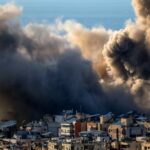
Education and health workers have been adopting different modalities of struggle in each locality: camps, road and street closures, mobilizations, occupation of workplaces. In recent weeks, these demonstrations have multiplied throughout the territory governed by the Renewal Front for Concord, which has been maintaining an alliance with the Casa Rosada. The Governor of Misiones, Hugo Passalacqua, is the second time he has held this position. The first time was under the Macri government, in 2015 until 2019.
“We have been fighting for 20 years against the Renewal Front that governs the province and that always aligns itself with whoever reaches the Nation, now it is with the Libertarians. “That is why we have always fought against all governments, both provincial and national,” say Miriam Chamorroteacher and member of the Liberation Pedagogical Movement” and adds that “both share responsibilities equally.”
They demand an increase of 100% against the official offer of 20%.“The struggles of education workers are recurrent. Year after year we go out to fight for our demands. This year we start in February, not only for salary reasons, although it is very important. Teachers in Misiones are practically destitute. There are positions for education workers such as tutors and librarians, which do not reach 250,000 pesos,” says Miriam, who lives and works in the town of Eldorado, 200 km from the provincial capital.
Marisabel, health worker He relates that they must confront, not only the government, but also the leadership of the provincial union: “We have had a salary table since April 16. They offered us 16%, it was not accepted, and the government issued the increase by decree and said: ‘this is it, whether you like it or not.’
On April 18, they began a provincial strike called by ATE. “And since last week we have had a fight plan. Where it is most visible is obviously in Posada, because they are close to the Ministry, but The measures extend to the entire province.” He says that the modality of struggle of the workers in the sector has its particularities “because we cannot close the hospital.” They go out to fight, guaranteeing emergencies, surgeries, and care for cancer patients. “Where the combat measures affect the most are in the outpatient clinics. But we guarantee guards in the emergency sector, as well as in hospitalizations and operating rooms.”
In this month of incessant fighting, Marisabel He tells us that they have to travel 200 km from Eldorado to reach the capital. “Each locality has to travel, because We have to be outside, we have to resist all health employees. Because the unions are always in agreement with the government”and adds “So, not only do we have the government against us, but also our provincial leadership, which does not even let us enter the negotiating tables.”
Maria is a teacher, is affiliated with UDPM, the official union, but says that she decided to go out and fight alongside the unions that today call for forceful measures. “We are complaining about the ridiculous increases they have been giving us since last year. We have an initial salary of 250,000 pesos, a percentage of that salary was paid by the nation, so we have been collecting it in installments. The last increase they gave us was 5%, plus some items that were late, so the increase was 10%,” he points out that “we have been complaining for a long time until we reach today, where, practically, the entire province is lifted.”
“For years we have been fighting not for salaries, but for historical demands of the sector. Due to other structural changes, for example We still have “ranch schools”, serious infrastructure problems, especially in the interior of the province. “Posadas and Gran Posadas is one world and the interior of the province is another where we continue fighting for adequate changes in the infrastructure for our students,” highlights Miriam.
María It also highlights the importance that teachers give to the structural problems of the school: “We are holding strikes and assemblies, our demands are for salaries, but also for building problems. In addition, the increase in food items, the stability of the goalkeepers. Together with the parents we are taking care of building problems, such as cleaning and repairs, but it is now impossible for us to continue contributing to this.”
Regarding the spirit of the workers who are fighting, Miriam highlights that it is “effervescent” and that “there is an awakening to go out and fight. When there is no other option, the workers take to the streets. There are camps in Eldorado, Jardín América, in Posadas and in different locations the protest is visible.”
Lidia is a health workerhas many years of service, but denounces that if the Bases Law is approved, if the pension moratorium is annulled, he will be left without retirement. He maintains that fighting just for salary is not enough. “The struggle of health workers, such as those in education, and the claims made by the Police, is about wages. But I think the fight should be to change this government. Because “If you get a raise and your parents can’t retire and your children have to go to a tuition-based university, it’s not going to be of much use,” although he emphasizes that the claim for salary recomposition is legitimate.
Miriam, María, Marisabel and Lidia coincide in that Misiones is a province where salaries are very low and the cost of living is very expensive. “International tourism arrives here all the time, and we are charged like they are.”
They also agree in denouncing precarious working conditions. “Because they are precarious contracts that do not transfer to the plant,” he says. Lidia and adds “I have colleagues who have contributions for 20 years, although they have many more years of service, they will not be able to retire either.”
“Also We continue to demand changes in our social work that does not meet the demands of members.. “In the interior of the province, above all, we do not have coverage,” he denounces. Miriam and adds that in schools “they are paralyzing the delivery of food items. They are not arriving, especially in primary schools, those on the border, nor are they being given to children who have extended days, where they should receive a glass of milk, lunch.”
María expresses solidarity with the most precarious sectors of the schools: “Substitutes were left without their positions when they unified classrooms that had 20 students and now they doubled them. “We are demanding that this resolution be taken to return the source of employment to our colleagues.”
“The health system is bad, it’s not that we don’t want to work. We do 16 hours of guard duty and it’s not enough. And like all workers, we are in debt, asking for loans, with our cards maxed out.” dice Marisabel and adds that salaries are very low. “A staff who has just entered public health charges 320,000 pesos, and those who have more seniority, with 35 years of contribution, are charging 500,000. As we said in the pandemic, we do not live with applause or monoliths.”
He also points out that the government does not care about public health or workers: “The province is burning and they say they have no money.”
Another is called provincial strike of education workers for next week. Even the official unions were forced to reject the government’s salary offers. They demand an increase of 100%, that the basic amount be increased, which is currently 74,900 pesos, so that there is mobility throughout the scale. An initial teacher, with the additional ones, earns 235,000 pesos, and a teacher with 20 years of work earns 300,000 pesos.
Health workers are also demanding a 100% salary increase. Another salary table is scheduled for next Tuesday. They distrust the government’s response and do not rule out roadblocks.
Lidia ends the interview by pointing out that “This fight that we are carrying out has to serve to show that there are underlying problems to fight for. We have to fight so that the Bases Law is not approved.” He added that this government is not interested in health “how will it be interested if when Milei was a deputy he voted against a law on congenital heart disease in newborn babies.”
Source: www.laizquierdadiario.com

